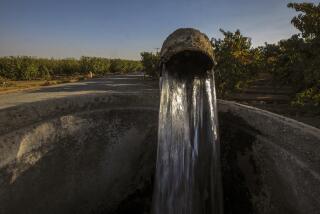Well Regulations Draw Protest From Ranchers : Ojai Valley: A water agency has ordered installation of meters. But users say they don’t want to pay for the resource.
- Share via
Upset over what they see as government intrusion, many Ojai Valley ranchers are questioning the purpose of a state-designated ground water agency and its authority to regulate their use of well water.
Dozens of ranchers have mobilized to oppose the Ojai Basin Groundwater Management Agency’s April 30 decision to force residential and agricultural well owners to register and place meters on their wells.
The meters will be used to monitor the amount of water taken, and eventually to charge well users for the water. The agency’s five-member board can order restrictions on pumping if future droughts affect the 4,800-acre basin, board members said. They say the ability to monitor water use is crucial to making sure the basin does not run out of water.
The agency required all users to register wells by July 1 and put in meters by Dec. 1 or face a $1,000 fine each day after the installation deadline.
Installing the meters costs owners $400 to $2,000, depending on the size of their wells. But most owners said they object to paying to extract water that has always been free of charge and regulation.
“It’s a big shock to me to learn that I don’t own the water beneath me,” said John McMullen, a farmer who uses a well to avoid paying high water rates to the Casitas Municipal Water District. “It’s too much involvement of government on the people.”
McMullen, along with about 25 other ranchers and residents, met in Ojai this week to complain among themselves and learn more about the restrictions.
Roger Essick, president of the agency’s board, attended the session to field questions and defend the agency.
Many ranchers said they have spent as much as $24,000 to build or maintain their wells. Most said they had no choice but to install wells to keep from buying water.
The ground water agency was created by the Legislature in 1991, at the height of the seven-year drought, to oversee water usage in the Ojai Basin. The state appointed members of four area water companies and a representative of the city of Ojai to govern the agency.
Some ranchers believe the board does not represent the valley’s well owners because four of the five members are connected to water companies, creating what they see as a conflict of interest.
But Essick said the board, as well as ranchers in the valley, has a vested interest in preserving the basin’s water supply.
“The common interest is that no one wants to deplete the basin that we rely on in the Ojai Valley,” said Essick, who owns a farm with his father. “I don’t like it. . . . No one likes it, but it has become a necessity.”
A recent study by the agency found 78 active wells in the basin. Essick said only 50 wells had been registered by July 1. Those who have not registered will be sent a follow-up notice but will not be fined.
“We’ve existed in this valley without any type of management at all,” said Lauren Kokx, who owns 50 acres of citrus and avocado orchards. “We rely on agriculture as income. I can’t even cut it now.”
The board is made up of representatives affiliated with the Southern California Water Co., Siete Robles Mutual Water Co., the Casitas water district and the Ojai Water Conservation District. Ojai Councilman Robert McKinney also sits on the board. The agency employs one part-time worker.
Essick said the board has to charge the well users primarily to keep $30,000-a-year agency functioning. The agency is currently funded through a $5-a-year tax on every homeowner who lives in the city of Ojai and the east end of the valley, where most of the farmland and orchards are.
After Jan. 1, 1995, only well owners will be charged, and they will pay as much as $7.50 per year for each acre they own, Essick said. The actual charges have not been decided on because the board has to hold a public hearing before voting, he said.
In comparison, the Fox Canyon Groundwater Management Agency, which oversees 750 wells in Oxnard and Camarillo, recently approved a $3 fee on every acre-foot of water taken from underground.
More to Read
Sign up for Essential California
The most important California stories and recommendations in your inbox every morning.
You may occasionally receive promotional content from the Los Angeles Times.










